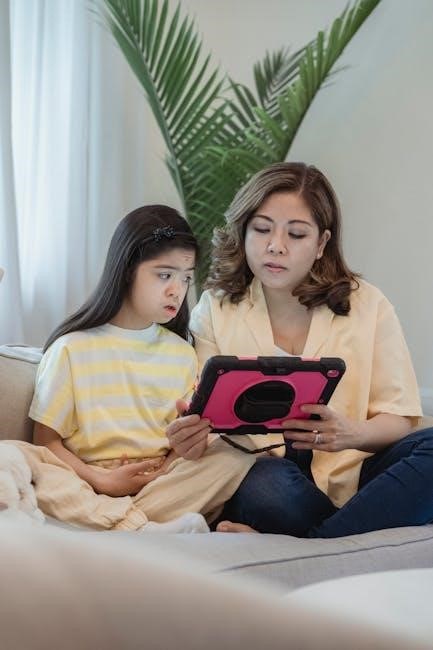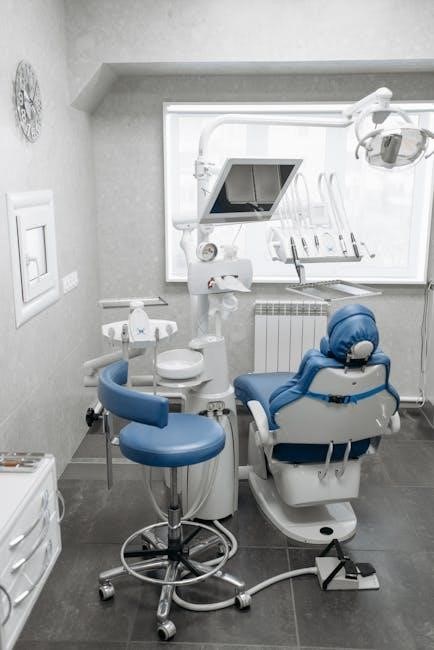
The long-term care functional screen is a comprehensive tool used to assess eligibility for care programs, ensuring individuals receive appropriate support based on their specific needs.
1.1 Purpose of the Functional Screen
The purpose of the functional screen is to assess an individual’s ability to perform daily tasks and determine eligibility for long-term care programs. It evaluates physical, cognitive, and functional limitations to identify needs and ensure appropriate support. This tool helps allocate resources effectively, ensuring individuals receive tailored care based on their specific requirements and conditions.
1.2 Overview of the Assessment Process
The assessment process evaluates an individual’s functional and cognitive abilities to determine long-term care eligibility. It involves standardized tools to measure daily living activities, cognitive function, and medical needs. The process ensures accurate identification of care requirements, guiding appropriate support and resource allocation for individuals with functional limitations or chronic conditions.

Target Audience for the Functional Screen
The functional screen targets frail elders and individuals with physical disabilities to assess their eligibility for long-term care programs.
2.1 Identifying Frail Elders
Frail elders are individuals with physical or cognitive limitations that impact daily living. The functional screen helps identify their specific needs to determine eligibility for long-term care programs, ensuring they receive appropriate support.

2.2 Individuals with Physical Disabilities
The functional screen assesses individuals with physical disabilities to determine their eligibility for long-term care programs. It evaluates mobility, dexterity, and ability to perform daily tasks, ensuring tailored support. This assessment helps identify specific needs, enabling personalized care plans that enhance independence and quality of life for those with physical challenges.

Eligibility Criteria for Long-Term Care Programs
Eligibility is determined through assessments of functional limitations and medical necessity, ensuring individuals receive appropriate support based on their specific needs and conditions.
3.1 Functional Limitations Evaluation
The functional limitations evaluation assesses an individual’s ability to perform daily activities and manage physical or cognitive challenges. This step identifies specific impairments that impact independence, ensuring appropriate care planning. Tools like ADLs and IADLs are used to measure functional capacity, helping determine the level of support required. The evaluation ensures personalized care plans address the unique needs of each individual effectively and compassionately.
3.2 Medical Necessity Determination
Medical necessity determination involves evaluating whether an individual requires a level of care that cannot be effectively managed in a less intensive setting. This assessment considers medical conditions, functional limitations, and the need for skilled interventions. Standardized tools and clinical judgment are used to ensure care aligns with medical requirements, optimizing health outcomes and resource allocation for those eligible for long-term care programs.

Key Components of the Functional Screen

The functional screen evaluates activities of daily living (ADLs), instrumental activities of daily living (IADLs), cognitive ability, and medical conditions to determine care needs effectively.
4.1 Activities of Daily Living (ADLs) Assessment
The ADLs assessment evaluates an individual’s ability to perform basic self-care tasks, such as bathing, dressing, eating, and mobility. This evaluation helps determine the level of assistance required for daily living. Professionals use standardized tools to observe and document the individual’s capacity to execute these tasks independently. The results are crucial for identifying care needs and ensuring eligibility for long-term care programs tailored to their functional capabilities.
4.2 Instrumental Activities of Daily Living (IADLs) Evaluation
The IADLs evaluation examines an individual’s ability to perform complex daily tasks, such as managing finances, cooking, shopping, and using technology. This assessment uses standardized tools to measure independence in tasks that support independent living. The results help care providers understand the level of assistance needed for these activities, ensuring comprehensive support tailored to the individual’s functional capabilities and promoting their ability to live independently.
4.3 Cognitive and Mental Health Screening
Cognitive and mental health screening evaluates an individual’s mental acuity, memory, and emotional well-being. This assessment identifies signs of dementia, depression, or other mental health challenges. Standardized tools and clinical interviews are used to determine cognitive function and mental status. The results inform care plans, ensuring appropriate interventions and referrals for specialized mental health services, promoting holistic support for overall well-being.

The Assessment Process
The assessment process involves preparation, administration, and interpretation phases. It evaluates an individual’s functional abilities and cognitive status to determine long-term care eligibility and support needs effectively.
5.1 Preparation for the Functional Screen
Preparation for the functional screen involves selecting a quiet, private space and ensuring all necessary tools and documents are available. Assessors should review the individual’s medical history and current functional status. The environment must be free from distractions to ensure accurate results. The individual should be informed about the process and made comfortable. Proper documentation and trained assessors are crucial for a reliable evaluation.
5.2 Administration of the Screen
The administration of the functional screen involves systematically evaluating an individual’s abilities using standardized tools. Trained assessors conduct face-to-face interviews and observations, ensuring clear communication and patience. The process includes demonstrating tasks and documenting responses accurately. The goal is to gather objective data to support eligibility determinations while maintaining a respectful and person-centered approach throughout the assessment.
5.3 Interpretation of Results
The interpretation of results involves analyzing data from the functional screen to determine eligibility for long-term care programs. Scores are compared against established thresholds to identify needs. Assessors must ensure findings are clear and actionable, supporting decisions on care requirements. Accurate interpretation is crucial for aligning support with individual needs, ensuring effective care planning and resource allocation.
Tools and Resources for Conducting the Screen
The functional screen utilizes standardized tools and resources, including assessment forms, guides, and software, to ensure accurate and efficient evaluation of long-term care needs.
6.1 Standardized Assessment Tools
Standardized assessment tools are essential for conducting consistent and reliable functional screens. These tools include validated measures like ADLs and IADLs checklists, cognitive assessments, and physical function evaluations. They ensure evaluators collect accurate data, enabling fair and uniform decision-making. Proper training on these tools is critical to maintain reliability and validity across all assessments.
6.2 Technology and Software Solutions
Technology and software solutions streamline the functional screening process, enhancing accuracy and efficiency. Digital platforms offer tools for data collection, scoring, and reporting, while software solutions provide automated assessments and real-time results. These technologies enable remote screenings, reduce administrative burdens, and improve accessibility for assessors and participants. They also facilitate secure data storage and compliance with regulatory requirements, ensuring consistent and reliable outcomes.

Documentation and Reporting
Accurate documentation and reporting are critical for tracking progress, ensuring transparency, and supporting care planning. Clear records maintain accountability and facilitate informed decision-making for all stakeholders involved.
7.1 Accurate Record-Keeping
Accurate record-keeping is essential for maintaining integrity in long-term care assessments. Detailed documentation ensures consistency, transparency, and compliance with program requirements. Properly stored records facilitate continuity of care, legal accountability, and informed decision-making. Regular audits and training help ensure data accuracy, supporting both client needs and program integrity effectively.
7.2 Generating Reports for Stakeholders
Generating reports for stakeholders is crucial for communicating assessment outcomes and care recommendations. These reports must be clear, concise, and data-driven to ensure informed decision-making. Standardized templates and digital tools streamline the process, enhancing accuracy and efficiency. Regular updates and tailored summaries cater to diverse stakeholder needs, fostering collaboration and effective care planning. Transparency and accessibility are key to building trust and ensuring alignment with program goals.

Training for Assessors
Training for assessors is essential to ensure accurate and reliable functional screenings.
Certification programs and ongoing professional development ensure assessors stay updated on best practices and tools.
8.1 Certification Programs
Certification programs provide assessors with standardized training to ensure proficiency in conducting functional screens.
These programs cover theoretical knowledge, practical skills, and the use of assessment tools, ensuring consistency and accuracy in evaluations.
Certification equips assessors to handle complex cases and stay updated on industry standards, enhancing the quality of long-term care assessments.
8.2 Ongoing Professional Development
Ongoing professional development ensures assessors stay updated on best practices and emerging trends in long-term care assessments.
- Workshops and online courses enhance skills in functional screening and data interpretation.
- Training focuses on new tools, methodologies, and regulatory changes.
- Continuous learning improves assessors’ ability to deliver accurate and compassionate care evaluations.
This fosters consistency and excellence in long-term care assessments.

Best Practices and Troubleshooting
Adhering to best practices ensures consistency and accuracy in functional screenings, while troubleshooting addresses common challenges, providing effective solutions to enhance the assessment process.
9.1 Ensuring Accuracy and Consistency
Ensuring accuracy and consistency in functional screenings is crucial for reliable results. Use standardized tools and follow established protocols to minimize variability. Proper training and regular audits help maintain quality. Clear documentation and cross-validation of findings further enhance reliability, ensuring fair and equitable assessments for all individuals.
9.2 Addressing Common Challenges
Common challenges in functional screenings include variability in assessments and interpreter bias. To address these, use standardized tools and ensure assessors are well-trained. Regular audits and feedback mechanisms can improve consistency. Additionally, providing clear guidelines and checklists helps reduce errors. Addressing these challenges ensures fair, reliable, and accurate assessments, ultimately improving the quality of long-term care programs.